'Our Youngest, Lost': My Daughter's Brave Battle with the Addiction That Killed Her 2 Days Before Her Son's Birthday
Opioids have killed thousands of people in America — newlyweds, honor students, grandparents and many more — and experts say the rate of fatal overdoses has accelerated in recent years. Alongside a special report on the epidemic in this week’s issue, on newsstands Friday, PEOPLE is publishing several first-person essays online from those who have lost loved ones to addiction, to put faces and names to the statistics and bring their stories to light.
This account is from suburban Seattle mother Christine Allen, about her daughter, Chelcee Jo Allen, as told to PEOPLE’s Alexandra Rockey Fleming earlier this year. It has been edited and condensed.
He is 3 years old today — March 8, 2017. We are watching the snow come down together. I do not know what he is thinking, but I am thinking of the mama he has lost: my daughter, Chelcee.
The younger sister my son has lost. The only daughter my husband and I have — our youngest, lost. A beautiful, brave, honest, loving person.
As a young child, Chelcee was exceptionally smart. She enjoyed ballet, she was MVP of her softball team. She was a member of the Young Eagles program and took several Cessna airplane flights. She was always in the No-Cavity Club at the dentist. She was on the honor roll in junior high. In high school, she was a social butterfly yet maintained the honor roll while playing on the volleyball team and working on the school newspaper.
She volunteered in her community, coaching Special Olympics and planting trees. She once said the best years of her life were when she was on the Hazen High School Drill Team, helping her squad win the state competition.
She was full of joy. We were all so proud of the young lady she was becoming. So very proud. She was a true asset to the family and a favorite among extended family. She even got an after-school job where she met a guy that made her feel new, exciting things that she never felt before.
She was the first in her immediate family to graduate high school, though her secret struggles had begun as had her new association with drug users.
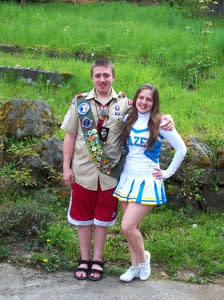
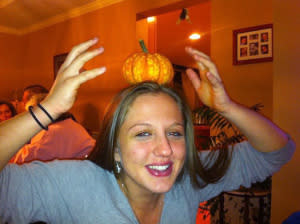
The next four years were dark. No more drill team, no more school friends. Drugs tore her down, broke her spirit and sucked the very life out of her.
And then she got pregnant. She didn’t want to live alone in a car with broken windows in the middle of winter in the snow and ice. She swallowed her pride and moved back home. She kicked the drugs and prepared to be the best mama she could be. I remember teaching her how to crochet like my grandma taught me. I had hope for her again.
I held her hand as her baby boy came into this world, three years ago today. How Chelcee loved her baby. When he was a few months old, she went back to school and earned her medical assistant certification. She got a reliable car. She even started attending church with the family. She was back on track.
For the next two years, she put everything into making a stable life for her son. But the darkness thickened. In August 2016, Chelcee entered inpatient treatment for addiction. Afterward, she moved in with her grandmother. She attended parenting classes and Narcotics Anonymous meetings. She lined up a job, qualified for housing assistance. Then her grandmother died. She didn’t want to come home so far from the recovery supports in place, so she moved in with her auntie and continued to move forward, searching for apartments and cleaning up her court obligations.
She was closer to getting her son back. But she didn’t tell us that she was still associating with people who used drugs.
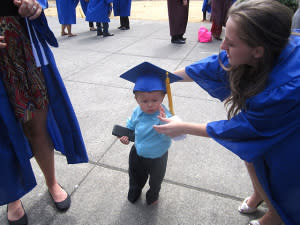
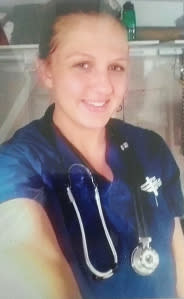
On March 6, 2017, after having a happy conversation on the phone with her auntie, my daughter made a sandwich and coffee, went into her room and locked the door. She got out her Bible books, her NA book, her sobriety coins and her autograph book from treatment. She shot up for the last time.
Chelcee died as she fell forward toward her pillow. At 25 years old — two days before her son’s birthday — heroin killed her.
Hours later, her uncle got home. All was quiet and he thought nobody was home. Five hours later, Chelcee’s auntie and uncle discovered her bedroom door was locked and the light was on. Her auntie went outside to look in the bedroom window and saw her bare feet on the bed. Her uncle broke the bedroom door in to get to her, but it was nearly nine hours too late. She was cold, blue, stiff and still clutching the syringe.
The medics rushed in, stopping when they saw her, instantly backing out so as not to disturb the scene. The sheriff guarded the room for the next five hours while her auntie and uncle, son, brother, father and I waited with the chaplain for the medical examiner.
Her father went in to see her. He had to. He immediately regretted it.
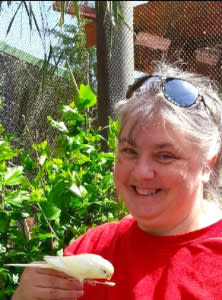
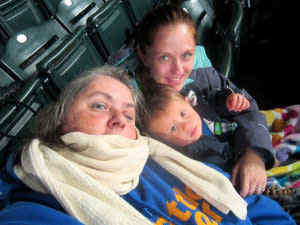
The medical examiner got there at about 3:30 a.m. He warned us that we might want to leave the room when they removed her. We all did, but her father went back in too soon. He saw the the body bag outside on the ground just before the medical examiner and the sheriff lifted her onto the gurney and wheeled her to the street in the snow.
Her brother and I went to her to say our goodbyes, knowing she could not hear us. I promised her I would take care of her son as best I could.
Her father came out, and together we watched the medical examiner drive away into the night with our daughter.
How and Where to Get Help
If someone you know is addicted, these groups may be able to assist:
Substance Abuse and Mental Health Services Administration, 800-662-4357: An agency of the U.S. Department of Health and Human Services, it offers referrals to treatment programs around the country.
ihateheroin.org: This Iowa-based nonprofit provides info and nationwide support for recovery assistance.
learn2cope.org: A support network for families dealing with addiction.
